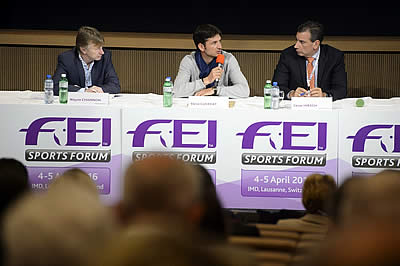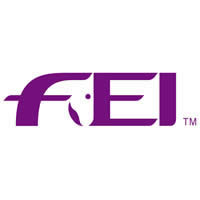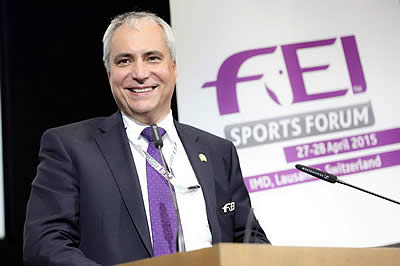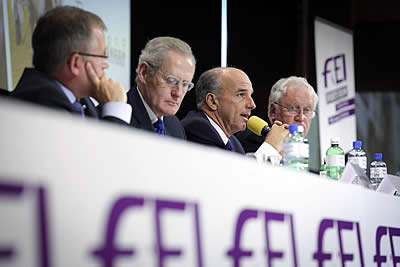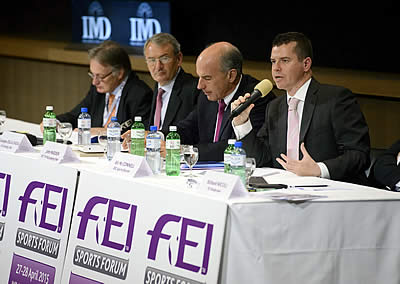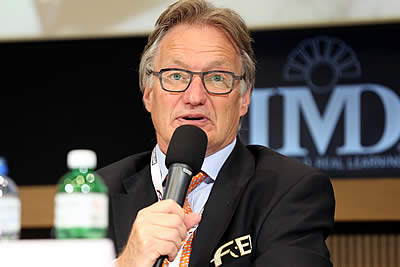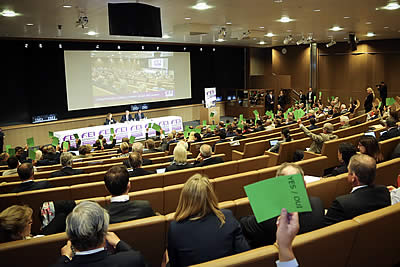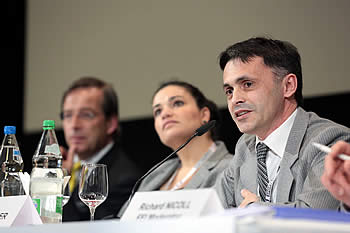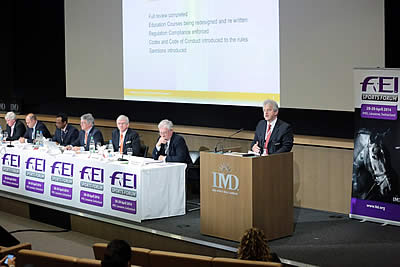Steve Guerdat (SUI), centre, with Wayne Channon (GBR), rapporteur, and fellow panelist Cesar Hirsch (VEN). (FEI/Richard Juilliart)
Lausanne (SUI), 4 April 2016 – “Being open and transparent is vital to us as we are discussing matters which have the intention to, and most probably will, affect the future of our sport,” FEI President Ingmar De Vos said in his opening address at the fifth edition of the FEI Sports Forum in Lausanne (SUI). “By coming together to share experiences and to discuss the future, we are showing our strength and unity as a sport and our willingness to lead and not be led.”
The two-day Forum has attracted a record number of 320 delegates, with representatives from the International Olympic Committee (IOC), National Federations, the Association of Summer Olympic International Federations (ASOIF), stakeholders, sponsors, riders, trainers, media, volunteers, guests and FEI staff almost filling the auditorium at the International Institute for Management Development (IMD) Business School, which has hosted the Sports Forum for the past four years.
IMD Professor Stéphane Garelli, the day’s first speaker, referenced the increasing impact of sport on the global economy. “When you look at sport, you are speaking of something that is joyful and happy. You have the privilege in sport and the FEI to bring happiness to people.”
The opening day was dedicated to FEI Officials, their career pathway, remuneration and education, with the sessions providing the opportunity to debate key questions related to the involvement of the National Federations, costs, calendar and geographical spread, standards and strategy.
“The Officials are a group of people that play an important role in our sport and without whom our sport would not be possible. Our officials are in the frontline when it comes to preserving integrity and ensuring that a level playing field is maintained,” Ingmar de Vos said.
The first session debated the optimal career pathway for FEI Officials, promotion, demotion, and sanctions. There was also debate on ways to measure the quality of officiating and whether there should be an age limit of FEI Officials.
Vicki Glynn, Chief Executive Officer of the New Zealand Federation, supported the removal of the age limit for FEI Officials. “Legally it is age discrimination. The age limit must be removed. We are one of only two organisations that retain age limits for officials. We should put a more effective evaluation process in place and like many countries do when renewing drivers’ licenses, you need to have an eye sight test, medical test.”
Delegates raised the importance of educational support from the FEI to increase the level of understanding of the sport amongst officials, and the correct application of FEI rules. There was general consensus that training and education are key to the development and understanding of the sport.
“People need to learn to follow procedures; judges need to learn that, but one thing we cannot miss is the horsemanship these people should have,” Olympic Champion Steve Guerdat (SUI) said. “Yes we need rules, the rules are black and white, but we must not forget we have a horse in our sport, a living animal, and the officials must understand the importance of horsemanship.”
Education was the focus of the second session, giving delegates the opportunity to raise questions on the involvement of National Federations in educating officials, balancing costs without impacting quality, and focusing on standards and education strategy.
Maarten van der Heijden, Secretary General of the Royal Dutch Equestrian Federation, called for standardised education material, and underlined the willingness of the Federation to share its own material for use by the FEI and other National Federations for education purposes.
“The riders want to have good judges so we can stay on a level playing field and look after our horses; we want clean sport and we want good judges,” Steve Guerdat said. “Unfortunately we need to find money and I understand it’s very expensive. On my point I would have absolutely no problem giving away part of the prize money, but I’m sure I’m one of the few riders.
“There’s a lot of pressure on those people; they have big decisions to take. We could maybe help them by creating a kind of panel to help them take the big decisions. It shouldn’t only be the steward and judges. Maybe have a vet, a rider, an independent person for the panel.”
Fellow panellist Rocio Echeverri also commented on the remuneration debate. “I really don’t believe that someone who does it on a voluntary basis is more or less professional. As an official, I’m 100 per cent committed whether I get paid or not. Getting more money doesn’t make us better officials. It’s about ethics. Payment does not make a better official in my opinion.”
“We don’t want to sacrifice quality to get quantity, or sacrifice quality for expense, quality is an investment,” said Wayne Channon, who was the only person to voice the view that all judges should be appointed by the FEI. Other delegates spoke in favour of retaining the split between Organising Committee and FEI appointments, stating that payment should come from whichever body appointed the Officials.
There was also concern expressed by a number of delegates for both the less developed nations and the non-Olympic disciplines. “Don’t forget the smaller disciplines that are less professionalised and with less prize money. These athletes deserve well educated officials too,” Maarten van der Heijden said.
FEI Secretary General Sabrina Ibáñez closed the first day’s sessions with a summary of the discussions on evaluation, age limit, mentoring, rotations, professionalism, subsidising education courses and remuneration with the help of the three rapporteurs.
“We can learn from other sports,” Sabrina Ibáñez said. “The conclusions will be brought to the Bureau and a task force will be created to look at the individual issues. We will come up with some concrete measures to present to you.”
After the session, the Secretary General commented on the positive feedback on the new way of running the Sports Forum. “We are genuinely committed to integrating members of our community and giving them a starring role in the discussions so that they could lead the debate as moderators and panelists. It was extremely well received by all the delegates as they felt they were an integral part of a direct dialogue.”
The detailed programme for the FEI Sports Forum 2016 is available to view and download here.
The FEI online platform is open for continued discussions on all topics raised at the FEI Sports Forum here.
The first session on Officials career pathway was led by moderator Sandra Wiedmer, Secretary General of the Swiss National Federation, with a panel made up of Teodor Sheytanov, Secretary General of the Bulgarian National Federation, Mariette Withages (BEL), former International FEI O-Judge, Marisol Casado (ESP), IOC Member and President of the International Triathlon Union, Hope Hand (USA), FEI Para-Equestrian Committee Member, with Reining Committee Member Pierre Ouellet (ITA) acting as rapporteur.
The second session, which focused Officials education, was moderated by Sally Ike (USA), with a panel of FEI Steward General Dressage Jacques van Daele (BEL), FEI Reining Committee member Raymond Grether (NED), FEI Executive Board Member & Athlete Committee Chair Maria Gretzer (SWE), and Peter Kallings (SWE), FEI List Group Member and FEI Testing Veterinarian. Harald Muller (GER), FEI Education & Standards Director, acted as rapporteur.
The third session, which focused on Officials appointments and remuneration, was moderated by FEI Jumping Committee member Stephan Ellenbruch (GER). The panel was made up of Peter Bollen (BEL), Jumping Committee Member, Rocio Echeverri (CRC), Endurance Committee member, Cesar Hirsch (VEN), FEI Nomination Committee Member and Swiss star Steve Guerdat (SUI). International Dressage Riders Club Secretary General Wayne Channon (GBR) was rapporteur.
FEI Media Contacts:
Grania Willis
Director Press Relations
grania.willis@fei.org
+41 787 506 142
Ruth Grundy
Manager Press Relations
Email: ruth.grundy@fei.org
Tel: +41 787 506 145
Shannon Gibbons
Manager Press Relations
shannon.gibbons@fei.org
+41 78 750 61 46
Leanne Williams
Manager Press Relations
leanne.williams@fei.org
+41 79 314 24 38
